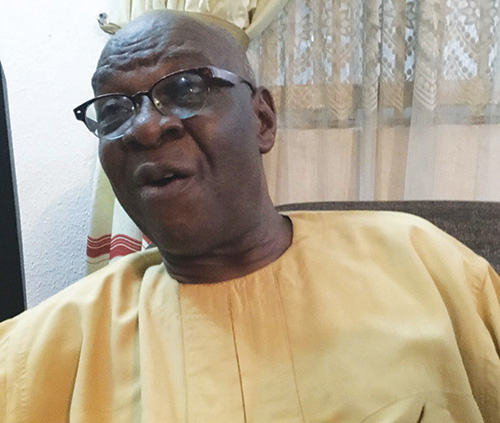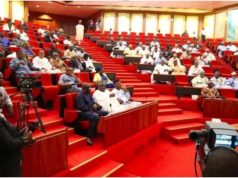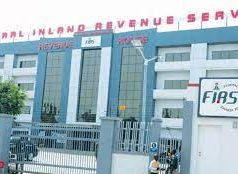By ABBANOBI-EKU ONYEKA
Dr. Kalu Idika Kalu, an economist, and former Nigeria’s Finance Minister is not happy with the outcome and developments that spun out of control from the Central Bank of Nigeria (CBN) naira redesign policy.
In this interview, he voiced his displeasure with the CBN for ruining the currency redesign, blaming the apex bank for not making adequate plans before venturing into the project.
He is irked that Nigerians have been undergoing so much hardship as a result of poor planning and implementation.
In order to assuage the pains of the citizens, the politician however advised those in commerce and industry and others to accept transactions with the old currencies, until the date they will seize to be legal tender. His position is captured in full below:
How would you assess the economic effect of the CBN policy to redesign the naira notes?
Before I came back to this country, people listened to me in Washington, New York, and London. I worked in Japan, South Korea, and Hong Kong. I can talk about the economy at any time. If you wake me up from sleep by 3 am, I can talk on the economy straight and I can’t indulge in looking away when the economy goes bad. That is me. So much mess has been done to the Nigerian economy. But the worst mess now is this so-called currency change or naira redesign.
Every country changes its currency and it is neither a big deal nor a new thing. As we speak now, there may be about six countries that are changing their currency denominations. The reasons for such a change may range from the age of the existing currency denominations that may render them damaged or too dirty not to represent the good image of the country any longer.
Some changes may be made with the reason to introduce new motifs, marks, images, and others. New pictures could be introduced to celebrate and immortalise the country’s heroes such as we have on our N1,000, N500, and N200 notes. Changes may also be necessitated to counter currency faking and counterfeiting.
However, in as much as it is a routine thing, before you do it, you have to study the economic peculiarities; you have to decide which one you want to make changes on. Some of the reasons we heard in the public space as the motivation of the CBN to redesign the naira such as stopping corruption, checking inflation, stopping vote buying, or countering counterfeiting are not correct. The CBN indeed said that. That means their points in educating the public on the motivations for the policy were not just accurate. These are aside from the timing and the projected deadline to phase out the old denominations. I am so sure that such points or reasons cannot be right or justified just because the CBN said so. Above all, managers of the monetary system have to agree on why they want the change.
Secondly, this is a large country. Nigeria is one of the top 10 largest countries in the world – over 200 million people scattered almost over 400 square miles. Therefore, you have to plan how to do it, so that people don’t even need to know what you are doing. They are not interested, all they need to know is that they want to change this currency. As the change commences, a date is given within which the old design would cease to be in use.
A reasonable central bank or currency-regulating institution does not embark on a change without studying how long it will take to print what should be fed back into the money market without causing disruptions.
However, on this project, the CBN didn’t do its homework; the agency messed it up. The blame for the failure also goes to the people that advise CBN, such as those in Aso Rock, including of course the president who didn’t seem to understand these intricate issues.
It is tragic that some Nigerians, including a lot of our people, don’t understand all these details I just gave you and they were supporting it because they thought they would stop somebody from buying votes. But for Christ’s sake, how many people are involved in buying votes to justify this large-scale and total disruption of what we call the supply chain? The supply chain is all the way down to the villagers who produce one thing or the other; including, of course, people who are involved in their private businesses. How many people are involved to justify the policy to change the currency designs to stop vote buying?
Since a lot of countries redesign currencies, why was ours special in its own way as you explain?
While I was in America some months ago, I hosted a press conference and said the policy was the normal thing, but you have to plan it to know how much time you need to print the replacement money. For Christ’s sake, you know how much time it will take you to dispense it through the commercial banks. You know the quality of electricity, so if you are forcing people to get money through POS or banks, you know how many people that have access to such facilities, especially in rural areas. So you put those things into consideration before you agree on how much time you need. It takes some countries two and a half years, three years, and one year to do this.
In a country like Nigeria, it is not a matter of a few months unless you already have the new notes printed before announcing the policy. You have to be sure. Furthermore, you have to know the logistics of printing and distribution. Unless you do all these works, you cannot just wake up and announce that by October 1 or the middle of November, or even by the end of December.
Before announcing any date, you must have done your homework because this isn’t a matter of emotional political decisions you just embark on to suit the fancy of Mr. President or Mr. Attorney General or the Senator or a governor or a particular political leader, no! It is a technical matter.
The issue is not about CBN having the right to do the change or not. Of course, it has such rights and powers, but in the exercise of that right, listen to what I am saying and consider the factors. That right presupposes that you know what you are doing. You don’t have to do everything, saying I am the CBN. I have the right to change the currency, therefore no supreme court. No, it is not done that way.
What will you advise those in commerce and industry and the general Nigerian market about rejecting the old notes?
It is simple. I advise all operators in commerce and industry and indeed the entire money market to continue to accept the old notes. The only time they will stop accepting them is from the 31st day of December, 2023as the Supreme Court ordered.
And what should they do if the commercial banks that issue out these old notes continue to reject them also as Nigerians observe?
Such banks should be punished. Nigerian traders should use their senses, and the citizens and the bankers should also use their senses and know when to do the proper thing and also when to stand up for their rights over such rejection. The CBN messed everything up. They didn’t use their senses, but that will be corrected. They should use between now and December 31st to print the new notes and be replacing the old ones as they print the new ones.
They should be printing the new ones, so that any time one goes to the bank, the banks should issue more of the new notes, until they finish retiring the old ones. That is the way it works everywhere in the whole world where people reason with their brains.
Naira notes are very scarce, even at the banks, and still, prices of goods and services continue to rise, instead of coming down. The POS operators literally sell the naira for naira through very high charges. What is the way out?
Many of us in the country don’t act right or apply wisdom to manage our challenges. This annoying tradition even starts with our government. As I said earlier, the people who changed the money should have planned it and brought enough currency. If they had brought enough currency, those who produce goods, those who supply those who produced goods, those who transport the goods, those who store the goods, and all others in the value chain will continue to do their work. But if you don’t print the currency, all those activities will stop. If those activities stop so suddenly as it has happened now, to those who don’t have money to buy them, the commodities may seem to be cheaper. Unless you produce more, the price will begin to go up again.










